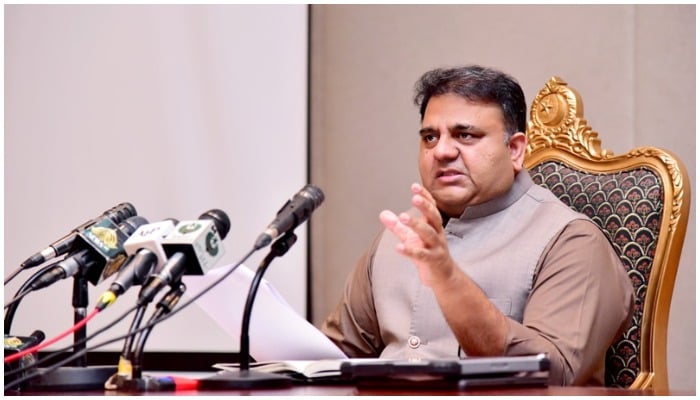'Nawaz's speech concluding Asma Jahangir Conference equal to mocking country, constitution'
Fawad Chaudhry says he has excused himself from attending conference when told it will conclude with "an absconder's speech"
Federal Minister for Information and Technology Fawad Chaudhry on Sunday said that former prime minister Nawaz Sharif concluding the Asma Jahangir Conference is "tantamount to mocking the country and the constitution", as he announced to have turned down the invitation to attend the event.
The federal minister, in a Tweet, stated the reason for excusing himself from attending the event held in Lahore to remember late human rights activist and trailblazing lawyer Asma Jahangir, calling the PML-N supremo "an absconder".
"I had been invited at Asma Jahangir Conference today. I was told that the conference will conclude with the speech of an absconder," Fawad wrote.
Earlier, Fawad had termed that the conference's conclusion with Nawaz's speech "a contempt of judges and judiciary".
"Conference addressed by CJP and senior judges is concluding with speech by an absconder. It’s nothing but contempt of judges and the judiciary," Chaudhry tweeted.
He further said that he has advised the Supreme Court Bar Association to "remain neutral".
"Advised SCBA that they should remain neutral, only then lawyers can contribute!" he wrote.
'We respect the government's point of view'
Supreme Court Bar Association President Ahsan Bhoon while speaking in Geo News programme "Naya Pakistan" said that there were 20-25 sessions in the conference and every session had a different topic.
He said that neither the judges knew who was going to address the conference and "nor was there a need" to tell them.
"Fawad Chaudhry was invited as a special guest on a session on Afghan issues but he didn't show up," said Bhoon.
"We respect the government's point of view. We also have our own point of view," he added.
CJP delivers fiery address on first day
Yesterday marked the first day of the conference, with Chief Justice of Pakistan Gulzar Ahmed delivering a fiery speech during the event.
The top judge appeared to lose his patience at sustained allegations of partiality against the judiciary, stressing that his court has never accepted pressure from anyone, nor will it ever do so.
Responding to a speech by veteran lawyer Ali Ahmed Kurd, in which Kurd had accused the courts of not working independently, the top judge lashed back: "I have never [taken dictation from] any institution and have never been under pressure from anyone."
"No one has ever told me what judgement I need to hand down and no one has dared to dictate me on my orders," the country's top judge said.
"No matter how many cases have come before me, I have never made a decision at the behest of anyone," he said.
“No one has interfered in my work — I have made my decisions according to my understanding and as per the Constitution and law.”
Seemingly making an indirect reference to the recent controversy involving former chief justice Saqib Nisar and ex-chief judge of Gilgit-Baltistan Rana Shamim, CJP Gulzar Ahmed said, “I have not taken anyone's dictation till today and my fellow judges follow the same conduct. No one can say that I have taken dictation.”
The visibly angry judge insisted that the courts have been working according to the law and that Supreme Court judges have been striving to serve justice to the people.
"When decisions are handed down, some people say they are right and some say they are wrong. These are the people's opinions and they have the right to hold them. Everyone has their own opinion and perspective, and it must be respected."
"This is the beauty of the judiciary and democracy and we will follow it,” he said. "Nobody can dare stop us."
However, differences of opinion do not allow any party to accuse the courts of being under pressure, the apex court judge underlined.
-
Security forces gun down 30 terrorists in multiple IBOs in KP: ISPR
-
MQM-P calls for new province in Sindh
-
US report validates Pakistan military edge over India: PM
-
Banned TTP poses serious threat to Pakistan security: UNSC panel
-
CM Afridi clarifies remarks on by-poll after ECP requests army deployment
-
Dubai sees 3.2m Pakistani passengers in 2025 as airport sets new milestone
-
Security forces kill 23 Indian proxy terrorists in KP's Kurram
-
Pakistan to construct island to boost oil exploration: report












